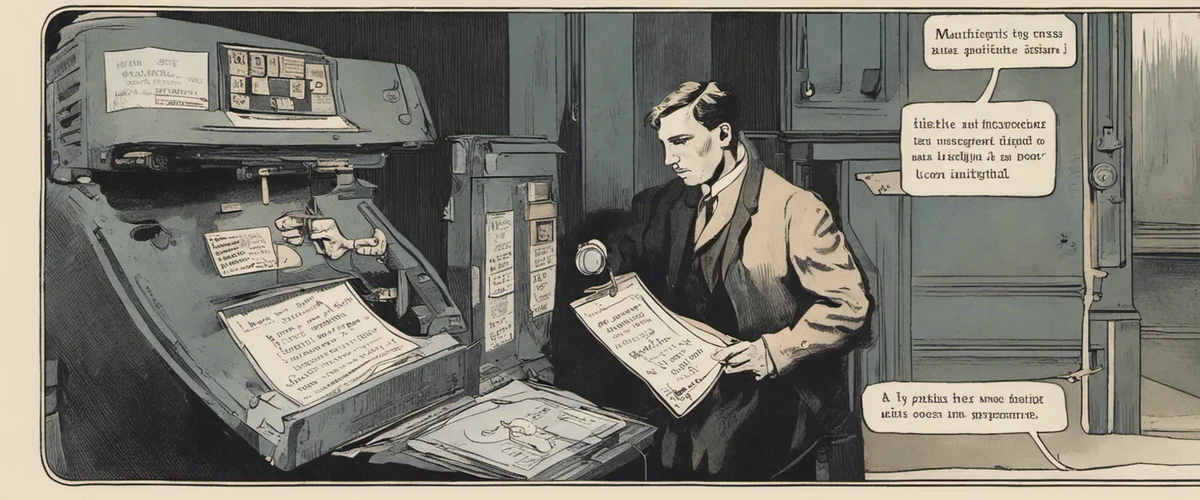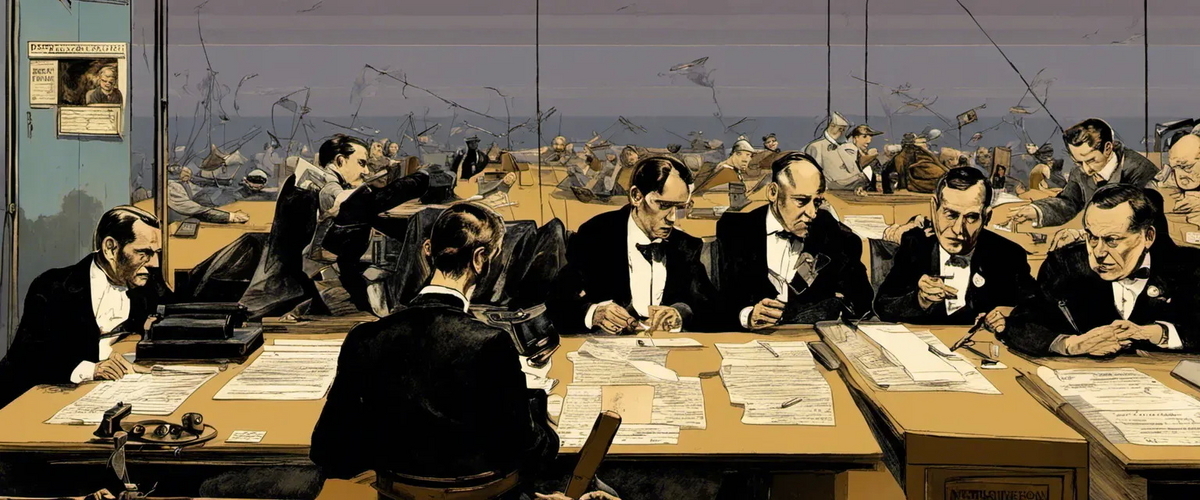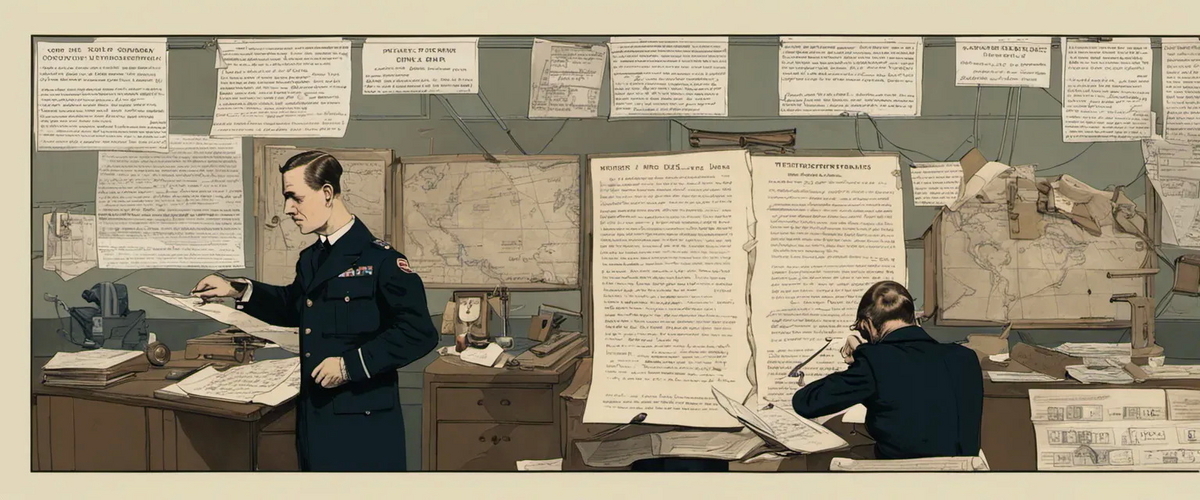
Chapter 1 What's The Zimmermann Telegram
The book "The Zimmermann Telegram" by Barbara W. Tuchman is a non-fiction account of the events surrounding the infamous Zimmermann Telegram during World War I. The Zimmermann Telegram was a secret communication sent by Arthur Zimmermann, the German Foreign Secretary, to the German ambassador in Mexico in 1917. The telegram proposed a military alliance between Germany and Mexico if the United States entered the war against Germany. Tuchman analyzes the telegram's impact on world politics and the role it played in the United States' decision to enter World War I. The book explores the diplomatic, military, and political aspects of the telegram, illuminating the complex web of international relations during that time.
Chapter 2 Why is The Zimmermann Telegram Worth Read
"The Zimmermann Telegram" by Barbara W. Tuchman is worth reading for several reasons:
- Detailed historical account: Tuchman provides a meticulously researched and well-documented account of the events leading up to World War I and the significance of the Zimmermann Telegram in shaping the war's outcome. She presents a comprehensive overview of diplomatic relations between Germany and the United States at the time and explores the telegram's impact on America's decision to join the war.
- Engaging storytelling: Tuchman's writing style is accessible and engaging, making historical events come to life for readers. She weaves together multiple narratives, including diplomatic intrigue, military strategy, and personal stories, which helps readers understand the broader context and its human impact.
- Analysis of diplomatic and military strategy: Tuchman delves into the complex web of diplomatic alliances and strategies employed by the nations involved in the war. She provides insights into the rationale behind Germany's decision to send the Zimmermann Telegram and the subsequent consequences of its interception by British intelligence.
- Examination of the significance: Tuchman considers the telegram as a turning point in American foreign policy, shaping the nation's shift from neutrality to active engagement in World War I. She explores the internal debates, external pressures, and public sentiment that influenced President Woodrow Wilson's decision-making process.
- Relevance to contemporary international relations: Although "The Zimmermann Telegram" focuses on World War I, its themes of espionage, intergovernmental communications, and the role of public opinion are still applicable to modern times. Tuchman's insights can help readers better understand the complexities of international relations and the impact of political decisions on global events.
Overall, "The Zimmermann Telegram" is a well-researched, engaging, and thought-provoking book that offers historical insights and lessons that remain relevant today.
Chapter 3 The Zimmermann Telegram Summary
"The Zimmermann Telegram" is a non-fiction book written by Barbara W. Tuchman, published in 1958. In this book, Tuchman explores the events leading up to America's entry into World War I by examining the infamous telegram sent by German Foreign Secretary Arthur Zimmermann.
The book begins by setting the stage for the events of World War I, describing the pre-war tensions between European powers and the United States' initial neutral stance. Tuchman delves into the factors that eventually pushed the United States towards entering the war, including Germany's use of unrestricted submarine warfare and the sinking of the British ship, Lusitania.
The focus then shifts to the Zimmermann Telegram, which was intercepted by British intelligence in 1917. Tuchman provides a detailed account of the telegram's contents, which proposed a military alliance between Mexico and Germany in the event that the United States joined the war. The telegram also hinted at the possibility of Germany offering Mexico financial support and the restoration of lost territories.
Tuchman explores the significance of the Zimmermann Telegram and its impact on American public opinion. She argues that the exposure of the telegram played a crucial role in turning public sentiment in favor of war, as it highlighted the threat that Germany posed to American interests.
The author also examines the role of British intelligence in intercepting and revealing the telegram. She discusses the challenges faced by British intelligence in decoding the message and the strategic decisions made to release the information to the United States.
Throughout the book, Tuchman provides historical context and offers insights into the political climate of the time, both in Europe and the United States. She explores the reactions of key figures, such as President Woodrow Wilson and Secretary of State Robert Lansing, to the telegram and their subsequent actions.
Tuchman concludes the book by discussing the impact of the Zimmermann Telegram on American entry into World War I and its role in shaping the subsequent peace treaties. She emphasizes the telegram's significance in shaping public opinion and argues that it played a major role in swaying the United States towards joining the war effort.
Overall, "The Zimmermann Telegram" is a comprehensive account of the events leading up to America's entry into World War I, focusing on the interception and revelation of the Zimmermann Telegram. Tuchman's meticulous research and engaging storytelling provide readers with a detailed understanding of the historical context and the telegram's impact on American foreign policy.

Chapter 4 The Zimmermann Telegram Author
Barbara W. Tuchman was an American historian and author, born on January 30, 1912, in New York City, and passed away on February 6, 1989, in Connecticut. She was known for her works on historical events and personalities, focusing primarily on the 14th through 20th centuries.
Barbara W. Tuchman released the book "The Zimmermann Telegram" in 1958. The book explores the events surrounding the interception and deciphering of the famous Zimmermann Telegram during World War I, which revealed Germany's plans to encourage Mexico to join the war against the United States. Tuchman's work delves into the impact of the telegram on American public opinion and its repercussions on international relations.
Apart from "The Zimmermann Telegram," Tuchman authored several other notable books. Some of her renowned works include:
- "The Guns of August" (1962): This Pulitzer Prize-winning book examines the first month of World War I, focusing on the diplomatic, military, and political actions that led to the outbreak of the war.
- "A Distant Mirror: The Calamitous 14th Century" (1978): Tuchman's in-depth narrative describes the 14th-century Europe, particularly France during the reign of King Charles VI, while analyzing the social, political, and economic factors that contributed to the devastation of the period.
- "The Proud Tower: A Portrait of the World Before the War, 1890-1914" (1966): This book provides an overview of the world from the late 19th century up until World War I, exploring various events and key figures during that period.
In terms of editions, it is subjective to determine which book is the best. However, "The Guns of August" is widely regarded as one of Tuchman's finest works and a classic in the field of historical writing. It has received numerous accolades, including the Pulitzer Prize for General Nonfiction in 1963.
Chapter 5 The Zimmermann Telegram Meaning & Theme
The Zimmermann Telegram Meaning
The "Zimmermann Telegram" by Barbara W. Tuchman is a book that discusses the events surrounding the transmission and impact of the Zimmermann Telegram during World War I. The main meaning of the book is to highlight the significant role the telegram played in shaping the outcome of the war and its consequences.
The "Zimmermann Telegram" was a coded message sent by German Foreign Secretary Arthur Zimmermann to the German Ambassador in Mexico in 1917. The telegram proposed a military alliance between Germany and Mexico in the event of the United States entering the war. It also suggested that Mexico should declare war on the United States and offered support in reclaiming states lost during the Mexican-American War.
Tuchman's book explores how the British intercepted and deciphered the telegram, strategically leaked its contents to the American government, and how it influenced the United States' decision to enter the war. She also delves into the broader context of World War I and its impact on international relations.
One of the main meanings of Tuchman's book is the importance of communication and espionage in shaping history. The Zimmermann Telegram was a crucial piece of intelligence that led to the United States' involvement in the war, ultimately tipping the balance in favor of the Allies.
Another key meaning of the book is the significance of diplomacy and negotiation in international conflicts. The telegram revealed Germany's aggressive intentions towards the United States and Mexico and underscored the need for swift and decisive action to counteract these threats.
Additionally, Tuchman's book highlights the power of propaganda and the media in influencing public opinion and rallying support for war. The publication of the Zimmermann Telegram in American newspapers created a surge of anti-German sentiment and galvanized public support for American intervention in the war.
Overall, the "Zimmermann Telegram" by Barbara W. Tuchman explores the historical impact and implications of the telegram, shedding light on the interconnectedness of politics, communication, and international conflict during World War I.
The Zimmermann Telegram Theme
The main theme of "The Zimmermann Telegram" by Barbara W. Tuchman is the impact of communication in shaping world events, specifically during World War I. Tuchman explores how the transmission and interception of the telegram influenced the course of the war and ultimately played a significant role in bringing the United States into the conflict.
Through extensive research and analysis, Tuchman highlights the crucial importance of communication in international relations. The Zimmermann Telegram, sent by German Foreign Secretary Arthur Zimmermann to the Mexican government in 1917, proposed an alliance between Germany and Mexico against the United States. Once intercepted and decoded by British intelligence, the contents of the telegram were made known to President Woodrow Wilson, who then made it public. This revelation had a profound impact on American public opinion, turning sentiments against Germany and ultimately leading to the United States' declaration of war.
Tuchman emphasizes the power of information and the ability of governments to manipulate public perception through communication channels. The Zimmermann Telegram, although initially intended as a private diplomatic communication, became a public catalyst for the United States' entry into the war. This highlights the importance of understanding the implications of written and verbal exchanges in shaping global events, as well as the potential consequences of intercepted and disclosed communications.
Additionally, Tuchman touches on the theme of international diplomacy and alliance building. The Zimmermann Telegram reflected Germany's desperate attempt to gain an advantage in the war by seeking alliances with other nations. It demonstrates the lengths to which countries were willing to go in order to achieve their objectives, even if it meant attempting to engage in secret negotiations with other nations. The intercepted telegram exposed Germany's intentions, leading to a loss of trust and further isolating Germany in the international community.
Overall, the theme of communication and its impact on World War I is the central focus of "The Zimmermann Telegram." Tuchman highlights how the transmission, interception, and disclosure of the telegram had far-reaching implications, ultimately influencing the course of the war and shaping its outcome.

Chapter 6 Other Accessible Resources
- The Secrets of the Zimmermann Telegram
- "The Zimmermann Telegram: Intelligence, Diplomacy, and America's Entry into World War I" by Thomas Boghardt. This book delves into the intelligence and diplomatic aspects of the Zimmermann Telegram, and how it influenced American public opinion and ultimately led the United States to enter the war.
- "World War I: The Zimmermann Telegram" by Susan K. Mitchell. This resource provides a concise overview of the Zimmermann Telegram and its significance in the context of World War I.
- "The Zimmerman Telegram and the Entry of the United States into World War I" by Peyton Ford. This article analyzes the impact of the Zimmermann Telegram on American public opinion and political decision-making, leading to the United States' involvement in the war.
- "The Zimmermann Telegram: Mexico's Secret Ven
Chapter 7 Quotes of The Zimmermann Telegram
The Zimmermann Telegram quotes as follows:
- "Nothing exaggerates like war or crime, yet we can never exaggerate enough the infamy of Germany in this act."
- "It was a classic case of don't shoot the messenger, except in this case the messenger deserved it."
- "America has always taken meanness of trickery by an enemy as a personal insult."
- "The idea of arousing Mexico against the United States tormented Wilson. He had always considered Mexico a weak and neighborly nation which the United States should protect."
- "The telegram was almost perfect espionage because by its own tenets, its secrets were to be read and regurgitated within hours in Mexico, to be read and discarded. It was a letter gone in seconds; its dispatch not only safe but, so to speak, one-time-use."
- "To a New World priding itself on enlightenment and progress, Zimmermann's telegram and America's failure to have its own spy system and the resultant disaster it caused must have seemed akin to witchcraft."
- "Considering the risk the Germans were taking and the caliber of the people with whom they associated, the cheapness of their trick is astonishing."
- "The Metropolitan [Hotel] is more than a hotel; it is an institution celebrated in the public prints because of the goings and comings of prominent men."
- "Japan would 'comeon' as Zimmermann promised and attack America. Japan was in fact the only member of the alliance who did not."
- "These three independent statements - the blocking of prohibition, the bulletin, and Mrs. Rablin [a medium who claimed to have received a message from the spirit of a soldier killed on the Sussex] - were important components of the moral puzzle which was contributing to the long-delayed firing of Zimmermann's gun."
Chapter 8 Similar Books Like The Zimmermann Telegram
- "The Immortal Life of Henrietta Lacks" by Rebecca Skloot:Delve into this fascinating work of narrative non-fiction that explores the intersection of science, ethics, and race. Skloot tells the true story of Henrietta Lacks, an African American woman whose cells were taken without her knowledge or consent and became vital for medical research, forever changing the field of science.
- "A World Undone: The Story of the Great War, 1914 to 1918" by G.J. Meyer: For those intrigued by World War I and seeking a comprehensive overview, "A World Undone" is a compelling choice. Meyer offers a meticulously researched and accessible account that traces the complex causes, key battles, and consequences of the war. From the political machinations behind the scenes to the experiences of soldiers on the frontlines, this gripping narrative provides a well-rounded perspective on the "war to end all wars."
- "Code Girls: The Untold Story of the American Women Code Breakers of World War II" by Liza Mundy: As "The Zimmermann Telegram" explores the world of cryptanalysis during World War I, "Code Girls" delves into the role of American women in codebreaking during World War II. Mundy sheds light on the contributions of thousands of women who played a pivotal yet often overlooked role in helping the Allies gain critical intelligence. This thoroughly researched and engaging book highlights the perseverance and intelligence of these unsung heroes.
- "The Splendid and the Vile: A Saga of Churchill, Family, and Defiance During the Blitz" by Erik Larson: If you enjoyed the historical context and the political intrigue of "The Zimmermann Telegram," you might find "The Splendid and the Vile" captivating. Erik Larson presents an enthralling account of Winston Churchill's first year as Prime Minister of Britain during the intense German bombing campaign known as the Blitz. Drawing from diaries, official records, and personal interviews, this book not only provides insights into Churchill's leadership but also offers a gripping depiction of life during one of the darkest periods of World War II.
- "Sapiens: A Brief History of Humankind" by Yuval Noah Harari
If you enjoyed "The Zimmermann Telegram" and have a keen interest in history, "Sapiens" is a must-read. Yuval Noah Harari takes readers on an exhilarating journey through the evolution of our species, providing a thought-provoking perspective on the development of human societies.